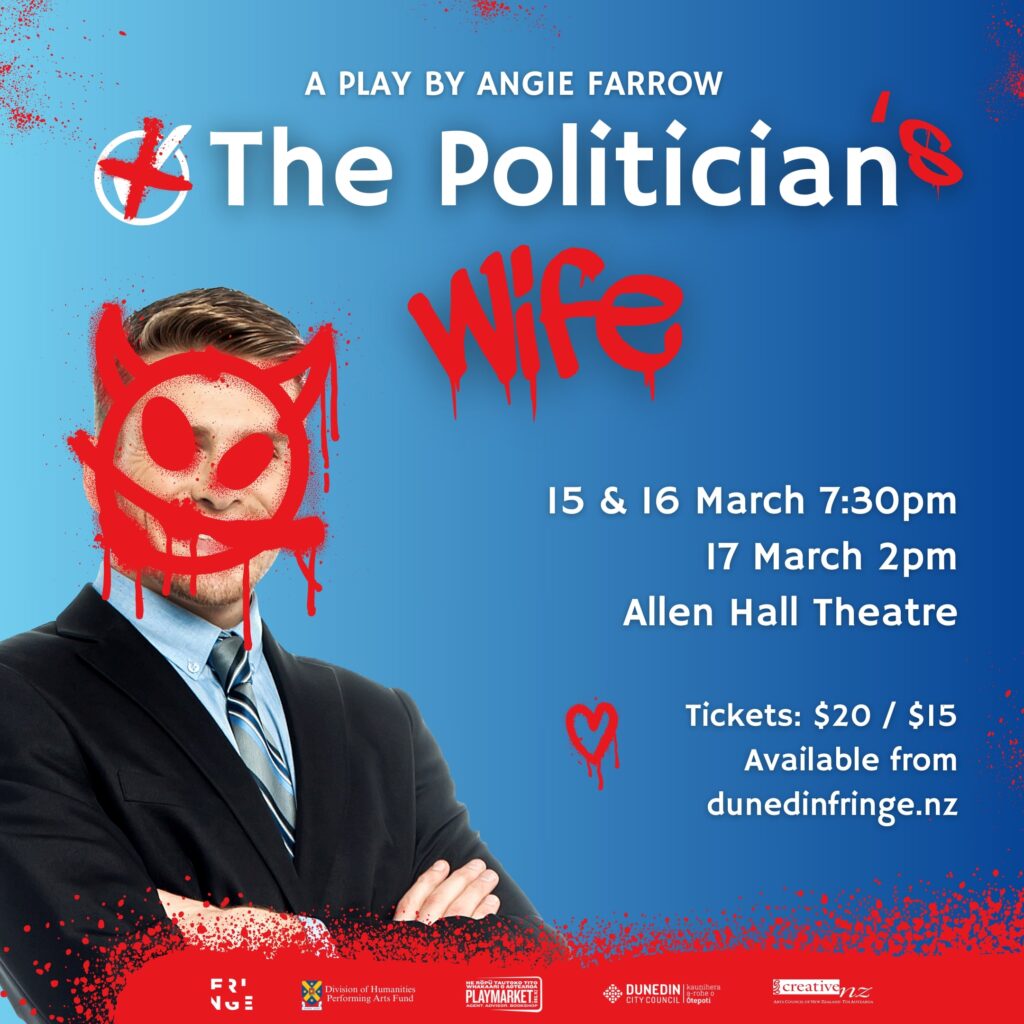The Politician's Wife
Allen Hall Theatre, University of Otago, Dunedin
15/03/2024 - 17/03/2024
Production Details
Playwright: Angie Farrow
Producer: Sahara Pohatu-Trow
Director and production design: Ash Dawes
AXIOM
“People don’t see you when you have no home.”
Against the backdrop of an election and a refugee crisis, Angie Farrow’s The Politician’s Wife asks what it means to belong.
Venue: Allen Hall Theatre
15/16 March: 7.30pm
17 March: 2.00pm
Tickets: $20 (full) / $15 (conc)
https://www.dunedinfringe.nz/events/the-politician-s-wife
Cast: Alana Jamieson, Andrew Brinsley-Pirie, Angelo Lukban, Grace Turipa
Production / Stage Manager: Olivia Temm
Theatre ,
90 - 110 mins
Actors work together like a well-oiled machine
Review by Phoebe Smith 16th Mar 2024
Angie Farrow’s The Politician’s Wife is perhaps even more timely now than it was in 2016, when it was shortlisted for the Adam NZ Play Award. As Ash Dawes’ director’s note tells us, “This play touches on many of the most pressing cultural issues we are facing: an increasingly radical political landscape, xenophobia, refugee crises, and climate change.” Both in script and production these issues are explored as poignant and compelling messages, presented with compassion but never patronising nor lecturing the audience.
The play opens on a light-hearted note with wife of conservative politician Stefan (Andrew Brinsley-Pirie) having a chance encounter (and a few lunch-time wines) with old friend and lover Jasper (Angelo Lukban). Wife Kim (Alana Jamieson) speaks at break-neck speed – and could slow down a little as we lose some of her lines in this scene – her comedic timing is perfect and she lands every joke – setting the audience up for a comedy, when what will ensue has much greater depth.
We go on to meet Latika (Grace Turipa) in a refugee camp. Latika’s emotions range between rage, anguish, despair, acceptance and grief. As with all of the actors Turipa plays multiple characters. While each of Turipa’s characters play a significantly different role, at times it is difficult to delineate between these emotionally, as they all at times dissolve into rage and shouting.
The production design (Ash Dawes) is excellent. In a play with a considerable number of transitions between short scenes and locations, the set design is well thought out, with each space pre-set and well delineated and complemented by a simple lighting design that consistently brings the audience’s eye to where it is desired to be. Actors and stage manager (Olivia Temm) near seamlessly shift from scene to scene in short blackouts that never disrupt the flow of the piece.
The costume design, too, is excellent with all four actors in black with minimal but noticeable changes, such as a hat or a jacket or tie, used to differentiate between their characters. These can be utilised so quickly and effectively that there is no noticeable gap in time between scenes even if the same actor is a different character in two that are consecutive.
This reviewer could have done without the sound effect during various political announcements and speeches that I eventually realised was applause, but initially thought was frogs.
All four actors work together like a well-oiled machine. Brinsley-Pirie’s Stefan is revoltingly brash and believable with his straight-backed arrogance – though he does have a tendency to shout which becomes somewhat over-bearing. Jamieson’s Kim beautifully manages to walk the line between being likeably garrulous and irritatingly so. It is vital for the audience to feel warm toward Turipa’s Latika, and she wins us over immediately and we only feel for her more as the play progresses. Special mention, however, must be made of Angelo Lukban who plays three significant characters each with specific body-language, voice and energy which he moves between within seconds with complete assurance and believability.
There are a few scenes in which the characters come together and speak as one – some pre-recorded and some live. While these worked well physically, when the actors spoke lines simultaneously, they came out in a monotone which removed the emotion from the scenes.
With a script that requires so many scene and role changes, it is a credit to director Ash Dawes that this production flows continuously and never slows the pace. While this is the case, and the play is never slow, it must be said that after a late start of ten minutes, the play went nearly 25 minutes over its scheduled finishing time – so perhaps expect a 15 minute longer play than advertised.
This is an extremely timely production that will, as the director’s note says, “Challenge you to think: about the lives we consider valuable, the lives we don’t, and the lines we draw between them.”
Copyright © in the review belongs to the reviewer





Comments